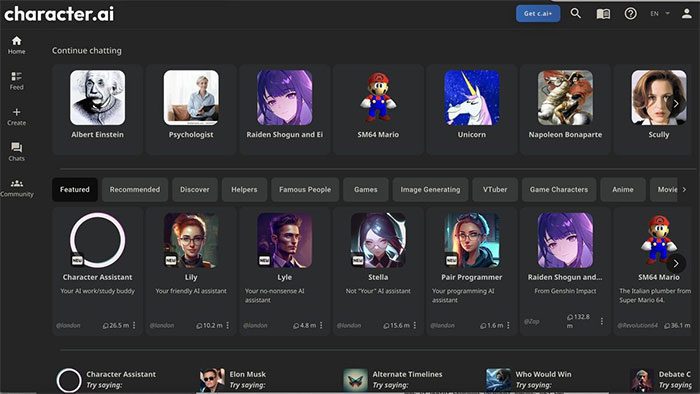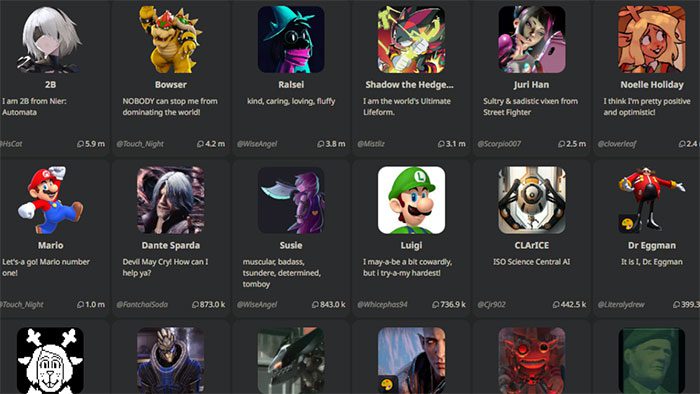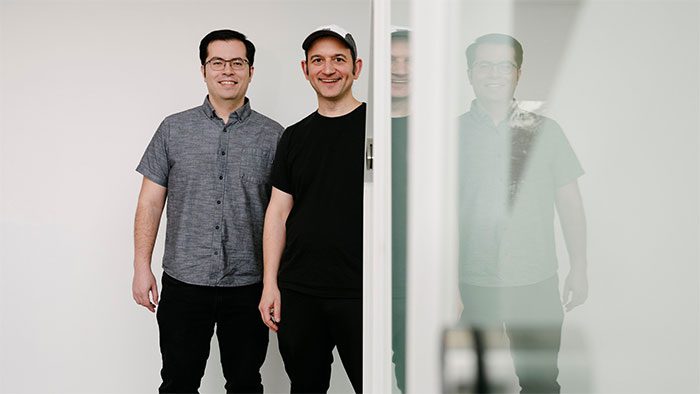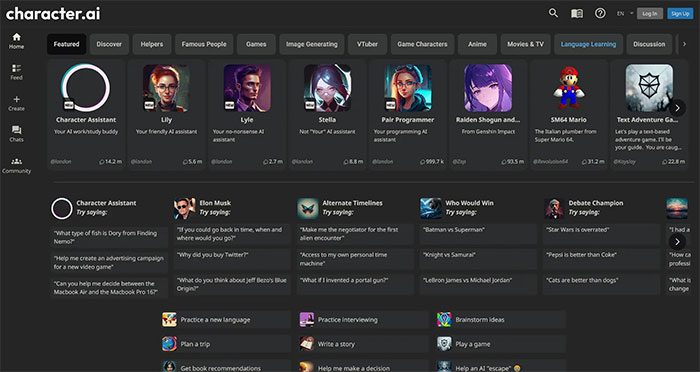The startup named Character.AI is valued at around one billion USD, thanks to its ability to allow users to create their own chatbots, simulating anyone they desire, including historical figures like Albert Einstein.
Albert Einstein passed away in 1955, but thanks to AI, this genius physicist can still converse with modern individuals.
This is all made possible by a chatbot on Character.AI, a startup that is now regarded as one of the emerging tech unicorns.
According to the latest statistics, the Einstein chatbot has responded to 1.6 million messages, explaining everything from the theory of relativity to mundane matters like pet recommendations.
Silicon Valley is currently experiencing a chatbot craze. OpenAI, the pioneering company in this field with ChatGPT, is now valued in the billions of USD for its concept of simulating computer programs that can effectively mimic human behavior.
Chat with Anyone, from Game Characters to Celebrities
However, Character.AI goes far beyond that. This artificial intelligence startup, currently valued at one billion USD, allows users to customize their chatbots to impersonate anyone and anything, from historical figures to famous billionaires.

Character.AI allows users to create their own chatbots, mimicking anyone they wish, whether alive or deceased. (Photo: Character.AI).
Fortune has described Character.AI as one of the most remarkable successes in the AI boom. As of May, Character.AI recorded nearly 200 million visits each month, and users have created over 10 million different chatbots.
Meanwhile, according to data from SensorTower, the Character.AI app has been downloaded over 2.5 million times, far surpassing other emerging chat tools such as Chai and AI Chatbot.
Users are excited about replicating their idol characters to chat with on Character.AI.
Fortune reported that there have been 36 million messages sent to Mario, the legendary character from the game Super Mario Bros.
Raiden Shogun and Ei, two famous characters from the game Genshin Impact, have also received nearly 133 million messages.
As expected, Character.AI’s user base leans heavily towards the younger generation. Another very popular character on this AI chat application is approximately a dozen versions of billionaire Elon Musk.
“I once joked that we wouldn’t replace Google but rather the parents of the users. However, we really don’t want to play the role of anyone’s parent,” co-founder and CEO Noam Shazeer said in an interview.

Users are excited about creating chatbot versions of famous characters in games. (Photo: Character.AI).
While possessing enormous potential, chat applications like Character.AI raise challenging questions about the future of AI tools.
A prime example is that the website for this application has as many as 20 versions of the Mickey Mouse chatbot, an intellectual property owned by Walt Disney, which leads to potential legal issues.
Massive Potential
In 2021, the duo of Noam Shazeer and Daniel De Freitas met while working at Google. They later decided to branch off and establish Character.AI.
Despite the company initially being deemed “ridiculous,” both are well-known figures in the AI community.
Shazeer is the co-author of a research paper on AI titled “Attention Is All You Need,” which serves as the foundation for generative AI technologies like ChatGPT today.
Additionally, Shazeer is the lead author of the research paper on Transformers, a language processing architecture developed by Google in 2017. To date, this machine learning model has been widely used in natural language processing, computer vision, and is seen as a “key” to chatbots.
De Freitas is even more renowned as the creator of Meena, a chatbot publicly tested in 2020 and later renamed LaMDA by Google – the large language model foundational for Bard.

Noam Shazeer and Daniel De Freitas, the founders of Character.AI. (Photo: New York Times).
Shazeer noted that from the first time De Freitas joined Google in 2016, he undertook a “lifelong mission” to bring intelligent chatbots to reality after reading some research materials on language technology.
At that time, De Freitas saw the potential of using Google’s large language research to build a complete chatbot.
“He didn’t have many personnel and started everything following the 20% rule. Later, De Freitas only recruited a team of 20% of employees willing to set aside their daily work just to help him with this system,” Shazeer explained, referring to the “20% rule” that allows employees to spend 20% of their time on projects outside their usual work to foster creativity.
The idea behind Character.AI is to create an open system, enabling users to transform the developer’s technology into anything they wish.
As De Freitas stated, the goal of Character.AI is to provide users access to “superhuman intelligence, deeply personalized to help them live their best lives.”
This introduction was so compelling that just 16 months after its founding, Character.AI secured over 200 million USD in venture capital from Andreessen Horowitz.
This AI application is so popular that service interruptions occur frequently. According to Fortune, the iOS app often displays a “server overloaded” message during morning usage.

The Elon Musk chatbot currently has up to 20 versions on Character.AI. (Photo: Character.AI).
However, the leadership at Character.AI sees this as a tremendous revenue opportunity for the startup. Specifically, users can pay to avoid interruptions when using the service.
By May, Character.AI had implemented a subscription service for 10 USD per month, allowing users to bypass waiting queues, access faster messaging, and enjoy many other perks.
“It really benefits everyone involved. Paying users will receive better service, while the company gains additional capital for the rest of the program,” Shazeer explained.
Even though it is creating a global sensation, AI also faces numerous challenges, particularly concerning abuse. According to Similarweb, many visitors access Character.AI through referrals from Aryion, a forum sharing short stories with a lot of adult content.
Furthermore, according to Zahr Said, a law professor at the University of Washington, Character.AI also faces issues related to image copyright, as users are permitted to upload any desired images during the chatbot creation process.
In other words, Character.AI allows large-scale impersonation, giving anyone the opportunity to have extended conversations with Taylor Swift or fictional characters that are copyrighted.


















































